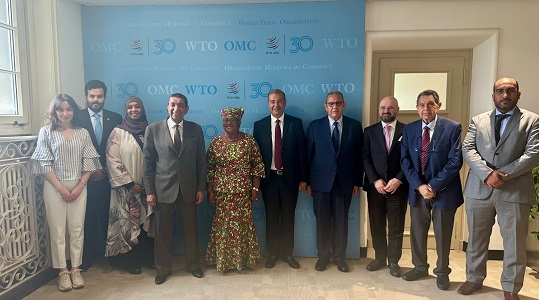The Secretary-General of the Union of Arab Chambers, Dr. Khaled Hanafi, during his visit to Geneva, Switzerland, to participate in the meetings of the General Assembly of the Arab-Swiss Chamber and the World Economic Forum, held a series of meetings with a number of prominent figures, where he met: Director-General of the World Trade Organization, Dr. Okonjo Lewala Ngozi, and Rebecca Greenspan, Secretary-General of UNCTAD, Deputy Minister of Investment of the Kingdom of Saudi Arabia, Ibrahim Al-Mubarak, Minister of Trade and Export Development of Tunisia, Kulthum bin Rajab, DAREN TANG, Director General of the World Intellectual Property Organization (WIPO), and DOROTHY TEMBO, Deputy Executive Director of the International Trade Center (ITC).
During the meetings, they discussed ways to enhance cooperation and coordination between the Union of Arab Chambers and international organizations, in a way that contributes to opening horizons of communication between businessmen and Arab and foreign investors, and increases the volume of trade and investment exchange between Arab and foreign countries.
During the meetings, the Secretary General of the Union gave an overview of the role played by the Union of Arab Chambers since its establishment in 1951 in terms of strengthening economic relations, whether between Arab countries or between Arab and foreign countries through Arab, foreign and joint chambers. He explained that "the private sector in the Arab region contributes a large percentage of more than 75 percent of the gross domestic product of the Arab countries, which is worth about 4 trillion dollars. Thus, the contribution of this sector will not be less than $ 3 trillion, in addition to its significant contribution to employment. Hence, it is necessary to involve it significantly in trade in order to support the growth of our business and contribute to achieving sustainable development in the Arab countries."
He explained that the Union of Arab Chambers is the first Arab economic institution that works at the non-governmental level and adopts the idea of cooperation and economic integration among Arab countries. He stressed that the Union played an important role in advancing trade cooperation between Arab countries at the trade and investment levels, in addition to calling for the establishment of the Arab common market and setting general principles that must be implemented in order to achieve economic unity among Arab countries. He pointed out that the Union of Arab Chambers is also working to support governmental and civil efforts aimed at integration and coordination between the economies of Arab countries in all sectors and commercial, industrial, agricultural, financial, investment, service, and other sectors and economic activities.
During the meetings, the Secretary General of the Union explained that the repercussions, variables, and major challenges facing global trade and international cooperation still exist and need more coordination and dialogue with all concerned parties to ensure business continuity and maintain economic expansion.
He stressed the importance of the Arab private sector being more integrated into the multilateral trading system to serve national goals and promote sustainable growth. He pointed to the importance of transferring the expertise and successful experiences of these international organizations to Arab countries and the Arab private sector, in order to approach the development process in the areas of competitiveness, intellectual property, digital economy, logistics, maritime transport, and the drafting of international laws. He explained that strengthening joint work with international organizations gives the Arab Chambers a wider space in various topics and makes them more effective and responsive to the needs of business owners at the external level. In addition to contributing to pushing the proposals and opinions of the business community in everything related to foreign trade and raising awareness of commercial frameworks and legislation.
He pointed to the importance of expanding relations, exchanging information and knowledge on arbitration and dispute resolution, and benefiting from the long experiences of international organizations in settling commercial disputes, which contributes to enhancing the competitiveness of the Arab business environment as a developed and contemporary environment that keeps pace with changes in the business community.
During his meeting with the Director-General of the World Trade Organization, His Excellency the Secretary-General considered that "one of the most prominent objectives of the Union of Arab Chambers at this stage is to strengthen the role of the Arab Chambers in representing the Arab private sector in the World Trade Organization, and to pave the way for the Union's membership in the organization as an observer in some important technical committees, such as the Technical Barriers to Trade Committee and the Sanitary and Phytosanitary Committee," stressing that "this step will enable us as a Union of Arab Chambers and as an Arab private sector to play a more effective role to formulate decisions that affect our international trade and better protect our interests".
"We firmly believe that Arab entrepreneurs are the main driving force of our economies, and they are the ones who have the ability to turn challenges into opportunities. Therefore, today we are called to actively participate and contribute to identifying the obstacles facing us and working together to find innovative solutions that support the growth of our business and contribute to achieving sustainable development in our countries."
Source (Union of Arab Chambers)

